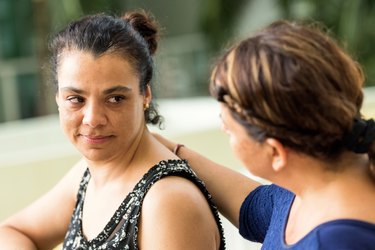
A breast cancer diagnosis can come as a shock. Feeling fear and anxiety, along with many other emotions, is a natural response.
Breast cancer is the second most common cancer in women in the United States, with more than 3.5 million women currently counting themselves as survivors, according to the American Cancer Society (ACS). Breast cancer statistics show in 2020 alone, there will be about 276,480 newly diagnosed cases, estimates the ACS.
Whether you're diagnosed with stage 0 or stage 4 cancer, being told that you have cancer has an emotional effect, says Kathleen Ashton, PhD, a health psychologist in the Breast Center, Digestive Disease and Surgery Institute at the Cleveland Clinic. "It changes how you think about life and mortality," she says.
It also takes time to process — and finally accept — the news, says Jennifer Hughes, PhD, a psychologist with UT Physicians and McGovern Medical School at UTHealth, who specializes in medical trauma.
"There's a fear, especially of the unknown," she says. "You're processing anxiety, sadness or even grief around the things that you may lose. Even if people have a good prognosis, they may still have to get a single or double mastectomy or lose time going to chemo and other appointments."
While the experience can be an "emotional journey," many people are able to work through their feelings and accept their diagnosis, Hughes says. Here are five steps you can take to better cope with a breast cancer diagnosis.
1. Learn More About Your Cancer
Knowledge is power — so it makes sense that one of the first steps you can take is to educate yourself about your condition, including what type of cancer you have, what stage it's in and what the treatment options are, Hughes says. "Until you have those basic educational pieces in place, there's just not enough room in our brain for higher level, more emotional processing," she says.
Make sure you're researching information from a reputable source, Ashton says. (You can always ask your doctor for specific resources or recommendations.) "I ask people to limit their internet research to a specific question and to set a time limit," she says.
Tip
After you find the answer you’re looking for, close the browser — and resist the urge to Google another question.
2. Meet With Your Treatment Team
In general, most cancer treatment centers try to treat people as soon as possible, Ashton says. That means that you could find yourself being treated within one to two weeks, she says. During this time, you might meet a breast surgeon, a medical oncologist, a genetics counselor, a psychologist and more.
"Typically, it's very relieving to meet with your team and discuss a plan," Ashton says. Afterwards, "most people's anxiety goes down a lot."
3. Seek Out Support
Your family and friends may be your rock, but it can be a good idea to seek out other people who either have cancer or whose cancer is in remission, Hughes says. "A cancer diagnosis can feel really isolating, even if you have a lot of people around you that love you," she says. "Being able to talk to other people who are going through similar things can be really helpful."
It's not uncommon for family members and friends to inadvertently ask questions that you don't want to answer, she says. "A support group can be a really great place to be able to share those frustrations and feel like you're not alone," Hughes says. If you can't access an in-person group, you can also join an online one.
Don't be afraid to ask for some space from your loved ones if you need it, too.
"It can be overwhelming to have too many people texting you and asking you what's happening," Ashton says. "Some people are taking care of their support systems more than they're taking care of themselves." If that's the case, you may want to ask someone to give health updates to your family and friends, or use a website or app like CaringBridge to post news about your treatment.
You may also find it helpful to request specific favors — for example, requesting a ride to treatment — from your loves ones, per CancerCare.
4. Practice Self-Care
Meditation, exercise, sleep — these healthy habits can help ease your stress, which can make it easier to cope with your breast cancer diagnosis, Ashton says.
In fact, research suggests that people with cancer who adopt stress management habits may see an improvement in their condition, she says. When people with breast cancer were placed in small groups that aimed to reduce their stress levels, among other things, they were less likely to see their cancer return and had better survival rates after 11 years than people who didn't receive any stress-reduction training, according to a December 2018 study in the journal Cancer.
Related Reading
5. Focus on Today
Try to keep up your daily routine as much as possible, Ashton says. That means seeing your family and friends and even continuing to work, if you're able. The goal is to try to maintain normalcy, she says.
"Focus on what you can control right now," Ashton continues. "For some people, their cancer may involve multiple steps, but it's too overwhelming to think 6 months in advance."
Tip
Try not to look too far beyond the next stage in your treatment, like the surgery or the recovery from surgery and so on.
Try, too, to give yourself credit for everything you've done so far. "Some people will feel like they can't do things like they used to before, which makes them feel less productive," Ashton says. "Instead of focusing on the days they couldn't work, I have them write down three things they accomplished," she says. A little self-compassion can go a long way.
Is this an emergency? If you are experiencing serious medical symptoms, please see the National Library of Medicine’s list of signs you need emergency medical attention or call 911.